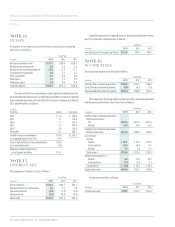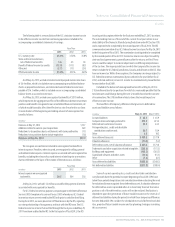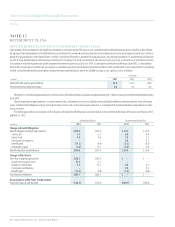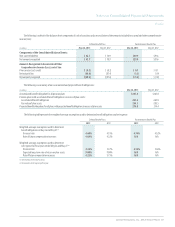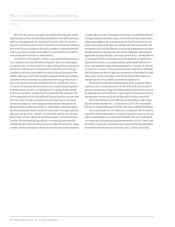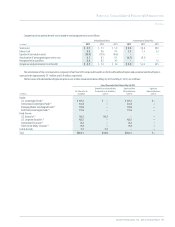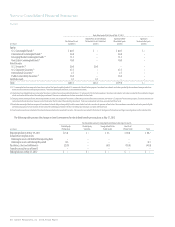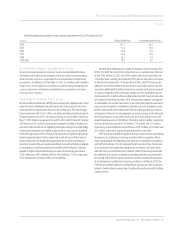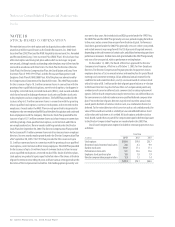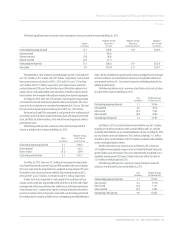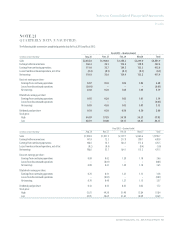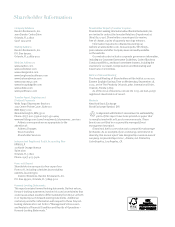Red Lobster 2013 Annual Report Download - page 68
Download and view the complete annual report
Please find page 68 of the 2013 Red Lobster annual report below. You can navigate through the pages in the report by either clicking on the pages listed below, or by using the keyword search tool below to find specific information within the annual report.
Notes to Consolidated Financial Statements
Darden
64 Darden Restaurants, Inc. 2013 Annual Report
All performance stock units outstanding as of May 26, 2013 will be settled in
cash upon vesting. As of May 26, 2013, our total performance stock unit liability
was $16.8 million, including $9.0 million recorded in other current liabilities and
$7.8 million recorded in other liabilities on our consolidated balance sheets. As
of May 27, 2012, our total performance stock unit liability was $31.3 million,
including $18.9 million recorded in other current liabilities and $12.4 million
recorded in other liabilities on our consolidated balance sheets.
Performance stock units cliff vest 3 years from the date of grant, where
0.0 percent to 150.0 percent of the entire grant is earned or forfeited at the end
of 3 years. The number of units that actually vests will be determined for each
year based on the achievement of Company performance criteria set forth in the
award agreement and may range from 0.0 percent to 150.0 percent of the annual
target. All awards will be settled in cash. The awards are measured based on the
market price of our common stock each period, are amortized over the service
period and the vested portion is carried as a liability in our accompanying consoli-
dated balance sheets. As of May 26, 2013, there was $11.1 million of unrecognized
compensation cost related to unvested performance stock units granted under
our stock plans. This cost is expected to be recognized over a weighted-average
period of 1.7 years. The total fair value of performance stock units that vested in
fiscal 2013 was $21.5 million.
We maintain an Employee Stock Purchase Plan to provide eligible employees
who have completed one year of service (excluding senior officers subject to
Section 16(b) of the Securities Exchange Act of 1934, and certain other employees
who are employed less than full time or own 5 percent or more of our capital stock
or that of any subsidiary) an opportunity to invest up to $5.0 thousand per calendar
quarter to purchase shares of our common stock, subject to certain limitations.
Under the plan, up to an aggregate of 3.6 million shares are available for purchase
by employees at a purchase price that is 85.0 percent of the fair market value of
our common stock on either the first or last trading day of each calendar quarter,
whichever is lower. Cash received from employees pursuant to the plan during fiscal
2013, 2012 and 2011 was $7.3 million, $7.2 million and $7.4 million, respectively.
NOTE 19
COMMITMENTS AND
CONTINGENCIES
As collateral for performance on contracts and as credit guarantees to banks
and insurers, we were contingently liable for guarantees of subsidiary obliga-
tions under standby letters of credit. At May 26, 2013 and May 27, 2012, we had
$107.0 million and $99.2 million, respectively, of standby letters of credit related
to workers’ compensation and general liabilities accrued in our consolidated
financial statements. At May 26, 2013 and May 27, 2012, we had $20.6 million
and $20.3 million, respectively, of standby letters of credit related to contractual
operating lease obligations and other payments. All standby letters of credit are
renewable annually.
At May 26, 2013 and May 27, 2012, we had $4.2 million and $5.4 million,
respectively, of guarantees associated with leased properties that have been
assigned to third parties. These amounts represent the maximum potential amount
of future payments under the guarantees. The fair value of these potential payments
discounted at our pre-tax cost of capital at May 26, 2013 and May 27, 2012,
amounted to $3.4 million and $4.1 million, respectively. We did not accrue for the
guarantees, as the likelihood of the third parties defaulting on the assignment
agreements was deemed to be less than probable. In the event of default by a
third party, the indemnity and default clauses in our assignment agreements
govern our ability to recover from and pursue the third party for damages incurred
as a result of its default. We do not hold any third-party assets as collateral related
to these assignment agreements, except to the extent that the assignment
allows us to repossess the building and personal property. These guarantees
expire over their respective lease terms, which range from fiscal 2015 through
fiscal 2021.
We are subject to private lawsuits, administrative proceedings and claims
that arise in the ordinary course of our business. A number of these lawsuits,
proceedings and claims may exist at any given time. These matters typically
involve claims from guests, employees and others related to operational issues
common to the restaurant industry, and can also involve infringement of, or
challenges to, our trademarks. While the resolution of a lawsuit, proceeding or
claim may have an impact on our financial results for the period in which it is
resolved, we believe that the final disposition of the lawsuits, proceedings and
claims in which we are currently involved, either individually or in the aggregate,
will not have a material adverse effect on our financial position, results of opera-
tions or liquidity. The following is a brief description of the more significant of
these matters.
In September 2012, a collective action under the Fair Labor Standards Act
was filed in the United States District Court for the Southern District of Florida,
Alequin v. Darden Restaurants, Inc., in which named plaintiffs claim that the
Company required or allowed certain employees at Olive Garden, Red Lobster,
LongHorn Steakhouse, Bahama Breeze and Seasons 52 to work off the clock and
required them to perform tasks unrelated to their tipped duties while taking a
tip credit against their hourly rate of pay. The plaintiffs seek an unspecified
amount of alleged back wages, liquidated damages, and attorneys’ fees. In July
2013, the District Court conditionally certified a nationwide class of servers and
bartenders who worked in the aforementioned restaurants at any point from
September 6, 2009 through September 6, 2012. Unlike a class action, a collective
action requires potential class members to “opt in” rather than “opt out,” and
members of the class will have 90 days to opt in following the issuance of a notice.
The Company will have an opportunity to seek to have the class de-certified
and/or seek to have the case dismissed on its merits. We believe that our wage
and hour policies comply with the law and that we have meritorious defenses to
the substantive claims and strong defenses supporting de-certification. An esti-
mate of the possible loss, if any, or the range of loss cannot be made at this stage
of the proceeding.
NOTE 20
SUBSEQUENT EVENT
On June 19, 2013, the Board of Directors declared a cash dividend of $0.55 per
share to be paid August 1, 2013 to all shareholders of record as of the close of
business on July 10, 2013.


